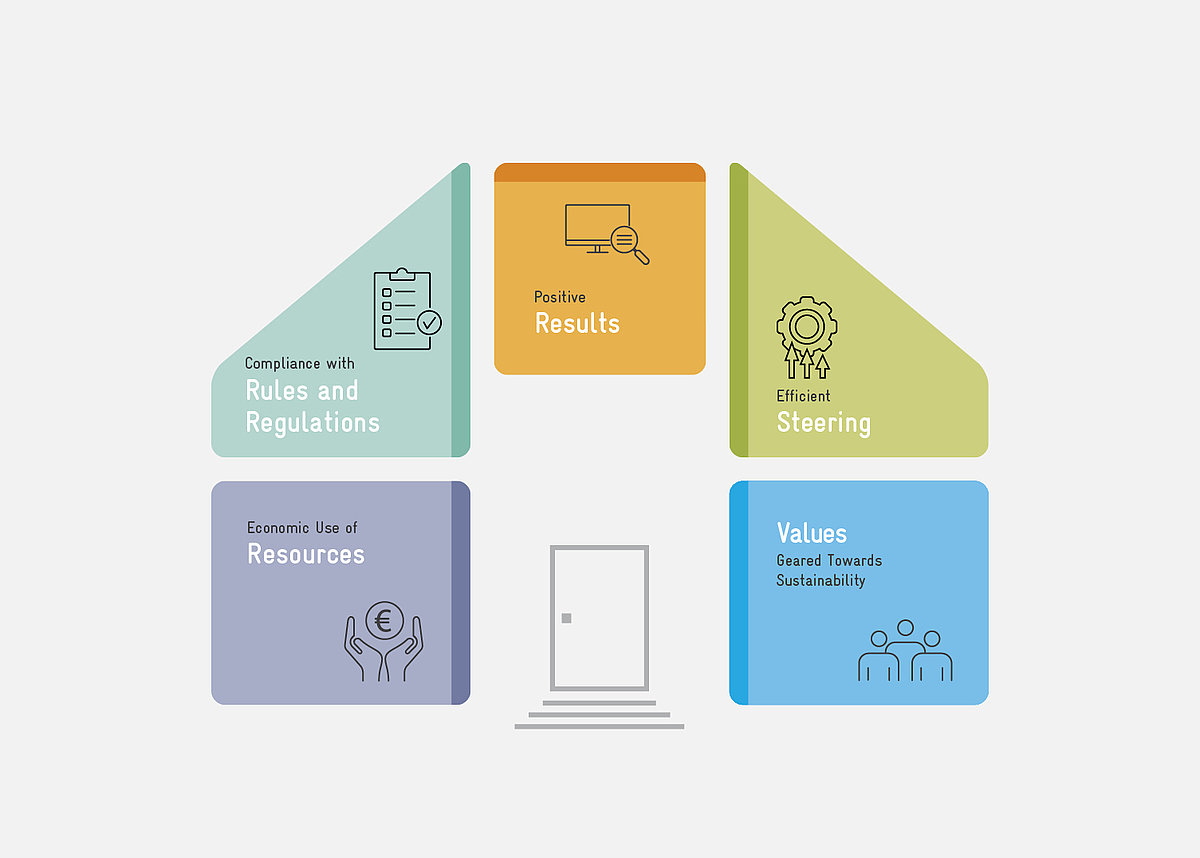SHARING EXPERIENCES, SAFEGUARDING QUALITY
Our understanding of quality
Quality plays a pivotal role in ensuring the effectiveness and sustainability of our work. Our understanding of quality is based on international standards. We also use the Capacity WORKS management model processes, supplemented by monitoring and evaluation. Furthermore, our work is subject to regular external audits.
Quality means achieving positive results. Our understanding of quality is also based on the following factors:
- sustainability-based values,
- economical use of resources,
- efficient steering, and
- compliance with rules and regulations.
Behind each of these factors are procedures, instruments and processes that are geared to specific needs. The Quality House model is GIZ’s internal frame of reference for our understanding of quality. It gives an overall picture of these individual elements.

Decentralised quality management
Our quality management and the underlying procedures and requirements are implemented on a decentralised basis, and responsibility for them lies with the relevant organisational units. The main actors responsible for the quality of service delivery in our projects are the officers in charge of managing and implementing our commissions, along with their specialist staff and managers. They have a particular duty to ensure the quality of our work. Quality management is a leadership task. Nonetheless, all staff obviously contribute to it through their day-to-day work. After all, quality assurance is an ongoing process that never ends.
In our continuous drive to improve our quality, we conduct regular surveys among staff, external stakeholders and commissioning parties, systematically analyse the results of these surveys and develop measures on the basis of these results. Corporate strategic evaluations are another internal quality instrument in our toolbox. These evaluations are designed to facilitate evidence-based decisions, changes and learning processes both at the strategic and operational level in order to boost the effectiveness, cost-efficiency and quality of GIZ’s service delivery and change processes.
External quality control
GIZ also undergoes an annual external quality control audit by the German Federal Ministry for Economic Cooperation and Development (BMZ), which randomly selects 50 GIZ projects and then uses specific audit criteria to conduct quality checks. Special emphasis is placed on compliance with BMZ requirements on the planning and implementation of these projects. The audit criteria are:
- compliance with development policy requirements,
- objectives system,
- offers and reporting,
- plausibility of the use of instruments, and
- value for money.
Quality control by BMZ is important, as it allows auditors from outside the company to evaluate our projects from a different vantage point. The ninth external quality control audit took place in 2021, focusing on the audit criteria of value for money and the objectives system. GIZ and BMZ analyse the results and discuss any necessary further steps. This ensures a shared understanding of our cooperation arrangements and helps us to continually improve the quality of our work.
Learning and innovation
GIZ sees itself as a learning organisation. That means that it uses knowledge and learning processes for innovation and the strategic development of its services, but also that it reflects on the principles that guide its actions in order to remain agile and be able to respond to changing parameters. This approach is an integral part of the ‘learning and innovation’ success factor in Capacity WORKS, the tool we use to manage and implement our commissions. In addition, a new guiding framework for knowledge management and learning in the age of digital transformation was developed in 2021, describing fundamental processes required to create knowledge, make it available and use it, and hence providing up-to-date guidelines on individual and organisational learning. It emphasises the need for diversity, transparency and networking in dealing with knowledge, thus helping to shape a corporate culture in which sharing experience and developing knowledge jointly within the company and beyond becomes the basis of our work.
One of the areas in which this approach is visible is in the training opportunities offered by the Academy for International Cooperation, which support staff and managers at GIZ with their learning. The Academy is increasingly providing options for self-directed, collective, on-the-job learning that empower individuals and at the same time mainstream a learning culture within the company.
The guiding framework was developed by the Alliance for Knowledge and Learning, an agile, cross-departmental network for steering knowledge management and organisational learning. It draws on central elements of the strategic project on Cooperation and Leadership, which has been strengthening learning, self-reflection and cooperation within the company since 2017. As part of the Cooperation and Leadership project, four principles were developed for cooperation within the company and are now part of our Corporate Principles. ‘Experiment and innovate’ is one of these principles and stands for having the courage to try and fail. We want to learn from our mistakes as early on as possible so that there is still time to change course. In a world characterised by increasing complexity and rapid acceleration, it is sometimes inevitable that approaches that have worked in the past now no longer do so. The important thing is to acknowledge this.
Experimenting and innovation are also at the core of the Innovation Fund, GIZ’s in-house call for ideas, which has been held every year since 2017. In 2021, the Innovation Fund focused on ‘Build back better – our contribution to a transformative recovery post-COVID-19’, looking for the best ideas for viable advisory approaches and services for the future to support sustainable development paths for overcoming the economic and social impacts of the COVID-19 crisis.
Information on the following Sustainable Development Goals (SDGs) can be found on this page:
